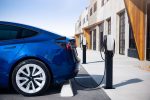
Waiting on Affordable Electric Vehicles Causing EV Demand to Slow in Europe, American Market Shows Decline Also
The electric vehicle (EV) market in Europe, which experienced significant growth for years, seems to be encountering a slowdown as consumers anticipate the arrival of more affordable models in the next two to three years. While fully-electric sales in Europe rose by 47% in the first nine months of 2023, major automakers like Tesla, Volkswagen, and Mercedes-Benz are expressing concern over the subdued response from consumers.
One of the key factors contributing to this deceleration is the prevailing uncertainty among consumers. Thomas Niedermayer, the head of a Bavarian car dealership, notes that many potential buyers believe that EV technology will improve, leading them to wait for the next generation of models rather than investing in current options that might quickly depreciate in value. This sentiment is echoed by individuals like Flavia Garcia and Tom Carvell in Edinburgh, Scotland, who express reservations about EVs due to concerns about charging infrastructure, battery life, and the comparatively higher prices.
AutoTrader reports that new EVs in Britain are, on average, 33% more expensive than their fossil-fuel counterparts. Furthermore, entry-level EV models that could appeal to a broader consumer base are not expected to hit the market before 2025, by which time they will face competition from an expanded lineup of Chinese EV manufacturers like BYD and Nio in Europe.
The hesitation to adopt EVs is not unique to Europe, as U.S. automakers are also experiencing a decline in demand. Ford and GM have recently announced delays in launching more affordable EV models, citing weaker demand and higher costs. The cyclical nature of the problem is highlighted by Felipe Munoz of JATO Dynamics, who states that demand will remain sluggish until affordable EVs become available.
While the intention to buy an EV has remained constant in Germany, according to a poll by consumer research firm The Langston Co, the disconnect between rising sales and consumer willingness to purchase suggests that sales growth may be a result of carmakers finally meeting backed-up orders due to supply chain bottlenecks, rather than an organic increase in demand.
Alistair Bedwell, head of powertrain forecasting at GlobalData, emphasizes the importance for automakers to keep an eye on competitors like Tesla and Chinese brands, as falling behind in the rapidly evolving EV market could have long-term consequences.
As the EV market faces what Philip Nothard, insight director at Cox Automotive, calls the “valley of death” between 2024 and 2027 – characterized by low residual values, high supply, and low demand – addressing consumer concerns and introducing affordable models will be crucial for sustaining growth in the electric vehicle sector.
Source: Reuters

